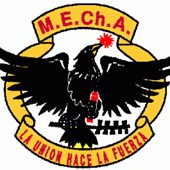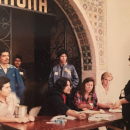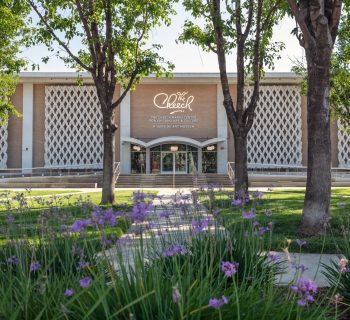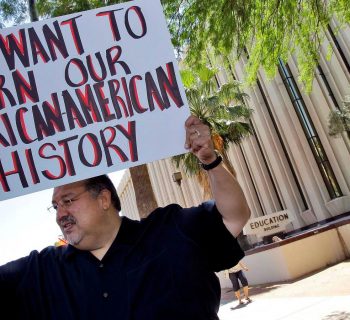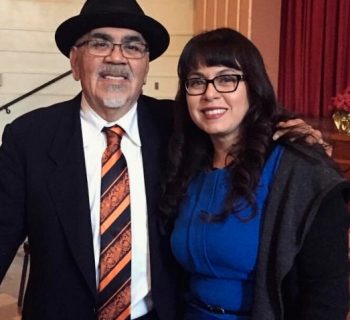By: Profe. Gonzalo Santos ~ April 4, 2019
"A rose by any other name would smell as sweet," says Shakespeare's Juliet to her lover Romeo.
Can the network of student organizations called "M.E.Ch.A." (for "Movimiento Estudiantil Chicano de Aztlán"), founded exactly 50 years ago to unleash and embody the historic "Chicano Student Movement" in the U.S. Southwest - a significant component of the ethnic insurrection of non-white peoples - modify its name to better reflect the present-day identities and new programs of social resistance, and "smell as sweet" as before?
There's been some changes already, especially modifying the "o" of Chicano to "o/a" or "@" or "x." Other changes made have added the broader panethnic label "Latino," as in "Chicano/Latino," which combined with the gender neutralization trend, can yield the intractable "Chicano/a/@/x-Latino/a/@/x." Even if it's still a rose, how does that smell to you, with a bit too strong wiff of political correct pesticide, perhaps? [As an important aside, "Hispanic" is deemed to pro-establishment, too "bourgie," and too Spaniard to be adopted as a label for any program of social resistance.]
MEChA students meeting at their summit in L.A. yesterday decided that they want to jettison both the "Chicano" and the "Aztlan" labels, though did not agree yet on any new name for their network. The reaction from the old timers has been immediate and furious (though a few welcomed it, even with self-deprecating humor, calling themselves "Chicanosauruses"). The "intransigents,” understandably proud of the identity they forged in the militant rebellion against educational invisibility, sociopolitical exclusion, and racial discrimination, do not seem to see the irony in their position: THEY themselves once jettisoned the label "Mexican American" in a fit of generational rebellion, seeing the then-widespread label as too assimilationist, too Anglo-conforming, only to invite the wrath of THEIR proud elders, veteran social fighters, too, against the oppression and exclusion of the "Mexican-Origin" population of the Southwest - then alternatively called "Spanish-surnamed," "Mexican race," "Hispano," "Latin American," etc..
The students should be commended, not censored! Their youthful instinct to re-define their identity for the times is sound and urgently needed. TheMEChAs - a movement originally defined by the pursuit of ethnic pride and social/cultural self-determination for the settled Mexican descent communities of the U.S. - has been in many ways marginalized, overtaken, and impacted by *transnational* issues like immigration, North American regional integration, globalization, etc. They now have the enormous challenge - we all do - of redefining their mission in light of today's daunting conditions, to reinvent themselves to fight more effectively in unity with others, with renewed purpose and a more sophisticate strategy of resistance.
We should not be afraid of renaming the rose, but concerned with amply watering it generation after generation of struggle for justice, to ensure it remains vibrant and ”smelling sweet."
As to labels, they are historic in nature. Just as we have placed "Negro" and "African-American" "Afro-descent," and "Black' in honorable places in the pantheon of names adopted by African-descent populations in their long struggle, and "American Indian" and "Native American" have earned theirs in the pantheon of names adopted by the First Peoples of the United States, "Chicano" and "Aztlan" have earned their honorable place in the pantheon of names adopted by Mexican-descent populations in the U.S. Southwest. But there are many who today connect to *all three* peoples, *all three* histories of struggles, and more, and who are vividly aware of the intimate interconnections - "intersectionalities" - that are *still unfolding*, their insoluble, interrelated mutuality still in flux.
As for rebellious immigrants like myself (who, since 2006, became mobilized around our transnational identity as conscious historic subjects, do not accept *any* domestic U.S. label, and are keenly aware of the disrespect we endure in both countries of origin, transit, and destiny), the challenge is to imagine a much broader vision - and name to go with it! - with which to better defend ourselves, a new way to reimagine our diasporas as *entitled* and *at home anywhere*, including here in the U.S. and in our homelands of origin; to be better equipped ideologically to assert and defend our "unauthorized" movements across all those stupid borders, and be better able to confront the intolerably unjust and irrational asymmetries of our continent - asymmetries framed since the 19th century and still imposed on all peoples of North America by the anachronistic nation-state construct.
Ethnicity is trapped in the nation-state construct, its program of liberation requires liberating the nation-state. But the nation-state is a prison! A better, more inclusive construct - and better labels to go with it - will be required in the 21st century. Europeans have their regional, albeit problematic construct; Africans and East Asians have incipient regional ones; Latin Americans - especially the South Americans launched a new construct this century, the Bolivarian vision of continental socialist integration, currently under attack by a resurgent world reactionary tide.
Where is the new vision for our liberation in North America, especially under conditions of resurgence of white nationalism & xenophobia, and the rise of neofascism? Can we set aside our old limited self-identities, labels and restrictive nationally-based constructs, and set as our task to develop new ones to match the times we face? Now, *that* would be a fragrant and colorful rosebush worth nurturing with the soil of all our still-fertile ethnic, class, and gender macetas, and watered by all the streams of our human migrant flows, don't you think?
But what would we call ourselves? ¡Ahí se los dejo de tarea!
Source: Profe. Gonzalo Santos ~ April 4, 2019

